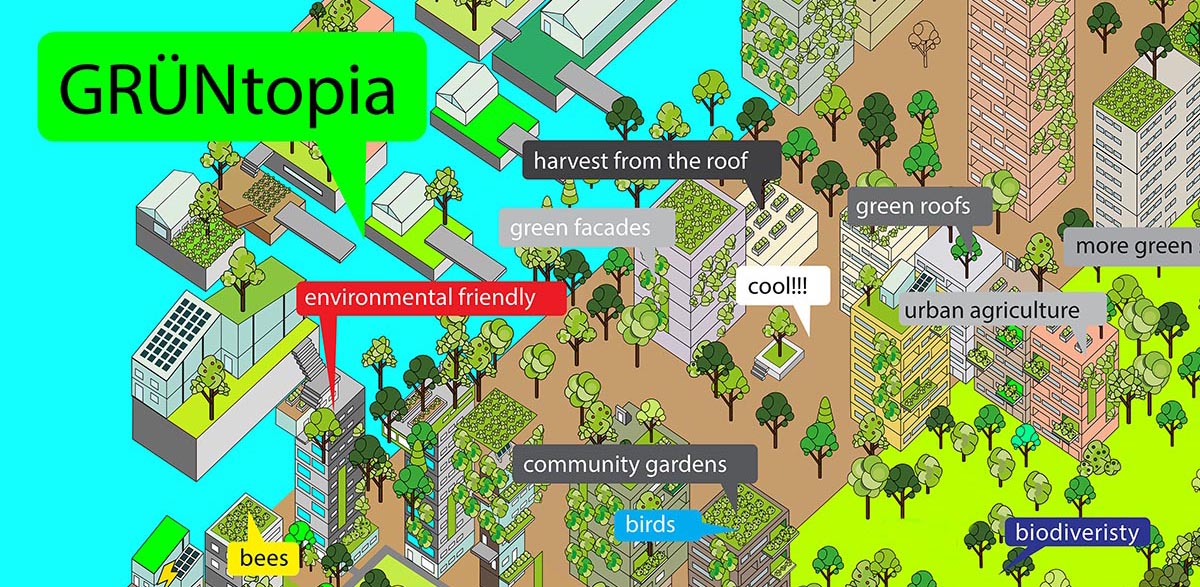Climate City explores how digital technologies contribute to addressing climate adaptation and develops digitalization strategies that take urban sustainability into account.
Climate City focuses on digitally supported participatory climate adaptation and is committed to the idea that a smart city should be a climate-conscious city.
Lectures & Discussions Climate City @ Humboldt Institute for Internet and Society, Berlin, 20 November 2019
Climate
City
Digitalization sets off a chain of environmentally damaging ripple effects, driving up energy and resource consumption. Fueled by highly energy-intensive practices, the much-needed progress in urban environment via digital solutions takes its toll, bearing an environmental cost.
An urban digitalization strategy needs to integrate sustainability and climate adaptation – a Smart City should be a climate-conscious city.
As Berlin’s Digital Strategy is being developed and formalized, it is imperative to call attention upon and raise awareness on the crucial issue of how can digitalization effectively contribute to sustainability, and to the improvement of the city climate more specifically.
Climate change is a very broad subject, where research and debates address interrelated, complex issues with far-reaching consequences. Climate change mitigation is in its own right an extremely rich and nearly all-encompassing endeavor. To facilitate fruitful, concrete discussion and exchange, the Climate City focuses on proactive urban climate adaptation, addressing initiatives and projects improving the city’s microclimate.
Adopted within a sustainability-minded framework, digitalization offers tools to process and communicate the dynamic complexity of (urban) climate models. The climate change mitigation’s social implications as well as climate justice demand to be embedded into an inclusive social discourse by means of collective, participatory processing on a society-wide scale. We are witnessing the rise and diffusion of global bottom-up social movements focusing on climate issues and using digital networked tools to mobilize citizens worldwide. Parallel to these multi-layered processes, digitalization provides tools for citizen participation, involving city users and dwellers in local climate adaptation initiatives.
Climate City focuses on solutions and participatory tools enabled by digital technologies that address climate adaptation. The program explores, amongst others, initiatives dealing with heat islands effects; Sponge City projects to manage sudden and heavy precipitations, preventing the risk of flooding and re-directing rainwater for urban development; bottom-up solutions to assess, monitor and improve air-quality in urban environment powered by Citizen Science.
At the intersection of climate data and participation, Climate City does not only provide a space for information exchange but aspires to contribute to developing networking fora, creating opportunities to develop concrete projects addressing the climate resilient cities.
Program
Prof. Elizabeth Sikiaridi & Prof. Frans Vogelaar, Hybrid Space Lab
Benjamin Knödler, der Freitag
Ryotaro Bordini Chikushi, CEO InfraLab Berlin
Dr. Jens Libbe, Head of Department for Infrastructure, Economy and Finance, German Institute of Urban Affairs
Bela Seeger, Open Knowledge Foundation Germany
Climate City is introduced by the curators of the City Making Lab program, Christian Grauvogel (Humboldt Institute for Internet and Society) and Prof. Elizabeth Sikiaridi and Prof. Frans Vogelaar (Hybrid Space Lab).
* Does digitalization offer solutions to address climate challenges?
* Can the Smart City be climate-friendly?
* What are the Climate-Smart Citizen tools?
* Does technology only benefit western industrialized nations or can digitalization contribute to global climate justice?

City Making Lab investigates ongoing developments at the intersection of cities and digital technology, engaging with urban mobility and public space, new patterns of space utilization for living and working, circular city, climate adaptation and healthy cities.
City Making Lab aims to bridge the gap between data and privacy experts and urbanists, architects, city makers, civil society and governance.
The leitmotif of City Making Lab – “digital macht stadt” – captures the potential of digital technology to power city development and re-define power in the city.
Climate City is part of the City Making Lab program series that focus on digitalization and the city, a co-operation between Hybrid Space Lab and Alexander von Humboldt Institute for Internet and Society.
related PROJECTS